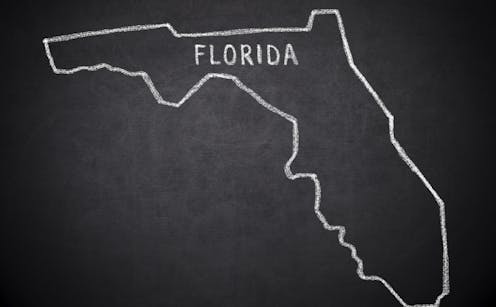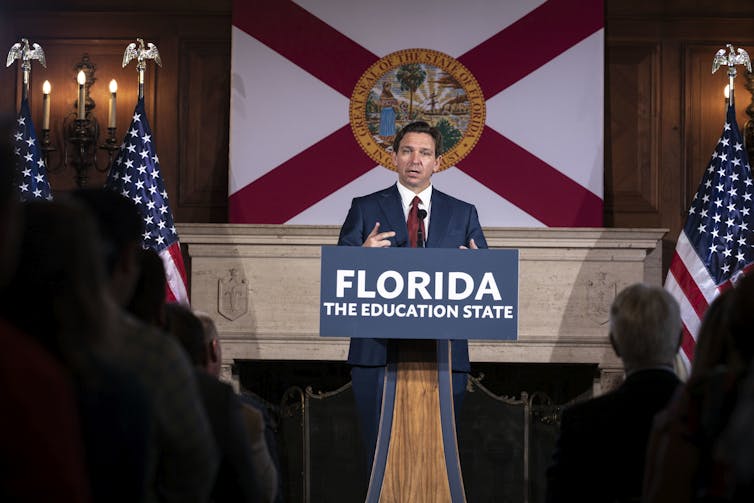Why Florida’s plan to end vaccine mandates will likely spread to other conservative states
Florida’s state Legislature will decide in early 2026 whether to eliminate long-standing obligations for schools to require their students to be vaccinated.

Florida Gov. Ron DeSantis announced a plan in early September 2025 that he intends to make Florida the first state to end vaccine mandates across all schools and in other state-run institutions such as nursing homes.
His proposal would dismantle Florida Statute 1003.22, which requires that all schools, including public and private schools, collect proof of students’ immunization for a range of communicable diseases when they enroll.
In 2025, approximately 88.7% of Florida kindergartners are vaccinated, which is almost 5% lower than the national average. Florida’s rate of vaccination for kindergarten students has steadily declined over the past eight years – and dropped from 93.5% in 2020 to 89.9% in 2024.
If Florida state legislators approve DeSantis’ plan when they convene in January 2026, the state would sweepingly eliminate long-standing obligations for schools and other places to require a standard set of immunizations for enrollment. Florida nursing homes currently assess whether residents should receive pneumococcal and flu vaccines.
As a sociologist, I study how education policy shapes democracy, social cohesion and inequality. I am also a professor of educational policy studies.
DeSantis’ plan is indicative of Florida’s general approach to approve education policy that is aligned with conservative priorities on “woke politics” and culture war issues, such as book bans.
Other Republican-led states, such as Alabama, Arkansas and Iowa, are typically quick to follow Florida’s lead and implement their own versions of Florida’s educational and social policies.

Florida setting examples
Well before DeSantis, Florida has tried to be a national leader of educational reform and has tightened state control over schools by reshaping standards on testing, school curricula and guidance on what can and cannot be taught in public schools.
Florida’s former Gov. Jeb Bush, who served from 1999 through 2007, helped lead this educational reform work. He was steadfast in increasing top-down accountability for educators, closely monitoring their performance by increasing high-stakes testing and tying teachers’ compensation to test results.
Bush also widely promoted policies to expand school choice for parents or policies that often allow any parent – regardless of income – to apply for state grants that use public money to pay for their children’s private school education.
Public school enrollment has steadily declined in Florida over the past two decades. While 86% of Florida students attended a traditional public school in 2001-2002, just 51% of Florida children went to a public school in 2024.
In 2022, Arizona became the first state to adopt a universal voucher system.
Florida then expanded its school voucher program in 2023 – allowing all parents, regardless of income, to use state taxpayer-funded scholarships to help pay for their children’s private school or home school experience. More than 500,000 Florida students received these vouchers in 2025.
Since 2024, 10 states plus Washington D.C. have adopted voucher programs.
Critical race theory on the front line
Since taking office in 2018, DeSantis has also set his sights squarely upon other hot-button issues, including by banning critical race theory from public schools in 2021.
Critical race theory, or CRT, is an academic framework that looks at how different forms of marginalization, such as gender or race, overlap, as well as how racism is embedded within American institutional and legal structures. DeSantis has said that CRT amounts to “state-sanctioned racism” that teaches “kids to hate our country or to hate each other.”
I and other experts on education considered this ban on CRT largely symbolic. The likelihood that K-12 educators are trained in CRT to then teach it to students seemed remote.
That same year, Florida rejected 54 math textbooks that officials felt contained CRT-related subject matter.
In 2023, DeSantis also cited CRT when he blocked Florida from offering the nonprofit College Board’s newly developed AP African American Studies course from public schools.
These actions made Florida one of the first states to place formal policy restrictions on CRT, effectively prohibiting discussions around race and inequality in public schools.
Since 2021, 44 other states have introduced similar bills. Approximately 28 states, including Texas, Idaho, Tennessee and Montana, have adopted at least one law limiting educators’ discussions of racism and sexism.
Anti-LGBTQ+ measures
In 2022, Florida also became the first state to prohibit classroom instruction on sexuality or gender identity topics from kindergarten through third grade. This law – formally called the Parental Rights in Education Act but often referred to as “Don’t Say Gay” – also restricts discussion on these topics in higher grades.
Though the law restricts formal classroom discussion or curriculum on sexuality and gender identity, teachers are allowed to discuss these topics in informal settings, such as student gay and straight alliance clubs.
By 2024, a growing list of at least 20 states, including Alabama and Indiana, followed Florida and introduced similar laws to “Don’t Say Gay.”

Book bans
Book bans are another prominent front where DeSantis has influenced how education looks in Florida – and in other states.
Book bans refer to schools and libraries removing books that are deemed controversial or inappropriate for students, often flagged for content related to race, sexuality or gender.
In 2023, Florida passed a law called HB 1069, which, among other things, banned books primarily flagged by parents or education officials for discussing or mentioning sexual topics.
One of these banned books was “Arthur’s Birthday,” a children’s picture book based on the animated PBS children’s series about an aardvark. The book was banned for including a reference to the game “spin the bottle.”
Florida’s schools banned approximately 4,500 books in the 2023-2024 school year, more than any other state.
A federal judge overruled a large portion of HB 1069 in August 2025, calling the categorization overly broad and unconstitutional.
Following Florida’s example, 33 other states passed laws about book bans in the 2022-2023 school year.
Overall, there has been a 200% increase in book bans nationwide from 2022 to 2024.
Beyond Florida
If Florida lifts its vaccine mandate, the decision would also affect other groups in Florida, including young children in day care centers and elderly residents living in nursing homes, which would also no longer require vaccines.
Private schools and universities would retain the ability to impose their own stances and vaccine requirements. However, private educational institutions in Florida often preemptively align themselves with state guidance.
Idaho loosened its vaccination rules in the summer of 2025, prohibiting schools from denying admission to a person who has not received vaccines. Louisiana has also said it will stop promoting mass vaccine campaigns.
As recent education policy history shows, Florida’s potential decision to end vaccine mandates in schools and other places would immediately have ripple effects across the nation. It is likely that if Florida strikes down its school vaccine requirements, this move will catalyze a rapid unraveling of similar public health protections across other states.
Anindya Kundu does not work for, consult, own shares in or receive funding from any company or organization that would benefit from this article, and has disclosed no relevant affiliations beyond their academic appointment.
Read These Next
Hezbollah − degraded, weakened but not yet disarmed − destabilizes Lebanon once again
Hezbollah’s entry into the current war followed the killing of Ayatollah Ali Khamenei. The group has…
Congress once fought to limit a president’s war powers − more than 50 years later, its successors ar
At the tail end of the Vietnam War, Congress engaged in a breathtaking act of legislative assertion,…
Housing First helps people find permanent homes in Detroit − but HUD plans to divert funds to short-
Detroit’s homelessness response system could lose millions of dollars in federal funding for permanent…






